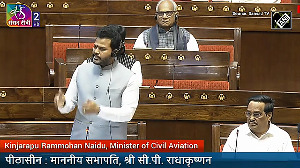Is an MBA always a wise choice?
"Yes," says the president of the non-profit Ritnand Balved Education Foundation and chancellor of Amity University, Atul Chauhan. Atul is also CEO of the AKC group of companies, which has worldwide interests in petrochemicals, healthcare and technology.
Born and brought up in Germany, Chauhan, who is in thirties, obtained his higher education in engineering and finance from University College London and London School of Economics, after which he took on the responsibility of heading the London office. He is now fully involved in Amity University and plans to open branches in eight countries, including the United States and the United Kingdom.
 In an exclusive interview with Onkar Singh at Amity' NOIDA campus -- spread over 600 acres and catering to 45,000 students -- he talks about the strides his centre of excellence has made in the last decade. Excerpts:
In an exclusive interview with Onkar Singh at Amity' NOIDA campus -- spread over 600 acres and catering to 45,000 students -- he talks about the strides his centre of excellence has made in the last decade. Excerpts:
What kinds of MBA specialisation are more popular these days?
MBAs are among the most popular programmes, but our course is the most sought among private institutes. Even those who have studied engineering join MBA courses to improve their job prospects. We have over 3,000 students doing general MBA programmes, but we also offer special programme like an MBA in International Business for those who want to start their own ventures abroad. We have another that focuses on the insurance sector, and one on competitive intelligence. We are constantly in touch with the industry to find out their requirements and model our courses accordingly.
Will MBA courses be as popular five years down the line?
I am sure they will. They could be even more popular. The course builds a solid foundation among youngsters from different spheres of life.
Why are young MBA graduates moving towards entrepreneurship?
When young students complete their MBA they think of various options before them -- one being the possibility of working for someone else, the other being applying what they have learnt to manage their own ventures. Earlier, parents wanted their wards to opt for government jobs that offered security. Now, bright young children who are financially well off are willing to take more risks.
Stress and strain often take a toll on young graduates. Do you teach them how to cope?
A large number of students feel the stress of growing competitiveness. To cope with this problem, we have counsellors and psychologists who tell them how to meet challenges on a day-to-day basis. They are given not just basics but also lessons on how to ease tension by playing chess or golf. They are also encouraged to incorporate these habits into their lifestyle, so it stays with them even after they leave the institute.
What is your advice to students deciding which career to pursue?
It is important for students to choose the right course. If they make a mistake here, their lives could change drastically. We offer a career and personality test to students before they join our institute. The students need not visit our campus; they can answer questions on the Amity web site. We use their responses to tell them which courses are best suited to them.
 Fresh graduates want to pick up jobs simply so they can start earning
Fresh graduates want to pick up jobs simply so they can start earning
Of course. However, we ensure that every student on our campus gets more than one offer. On an average, our students are picked up a year before they pass. 90 per cent of students who will pass in 2008 have already been given job appointments. The average salary ranges between Rs 4 lakh and 9 lakh per annum.
How can professionals improve their communication skills?
We have a separate unit comprising 25 people whose sole job is to ensure how students can improve their personality, especially technicians and engineers who need to improve their communications skills.
What is the hottest course offered, and the job prospects?
As financial markets are doing so well, courses related to finance attract a lot of attention. We also emphasise loyalty and honesty to the organisation a student works for. We stress on integrity and hard work.
What are the assets and drawbacks of doing MBA?
We have already discussed the positive aspects of the MBA programme. We prepare students to learn from the mistakes of others during our lectures by chief executives and management gurus from India and abroad. We hold special sessions with students where top people from the industry interact with them.
Does having an MBA matter?
Of course, it does. We get 25,000 applications in every academic year, and accept only 300 students. I would say that our MBA students compare to the best in India, second only to the IIMs.
Are you planning to stick to India or go abroad as well?
We have a huge campus in Noida. Every year, new courses are being added. In a couple of years from now, we will also have courses in medicine that will be attached to our own hospital in Gurgaon. We are planning to set up branches in the US, the UK, Germany and many other countries over the next few years.





